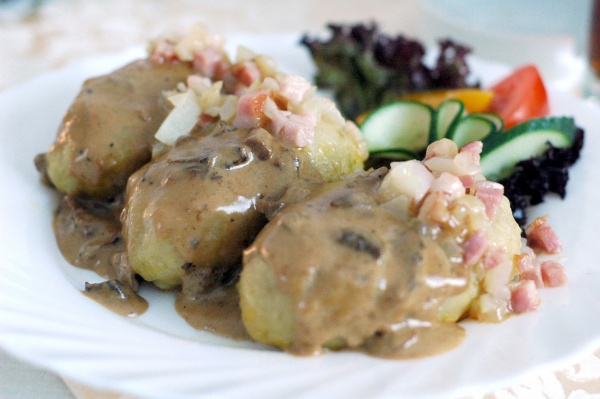Facts About Lithuanian cuisine
Lithuanian cuisine is a delightful blend of flavors shaped by the country's cool, moist northern climate. The staples include barley, potatoes, rye, beets, greens, berries, and mushrooms. Dairy products are a highlight, and pickling is a common preservation method. Soups are particularly popular and often praised for their health benefits.
Over the years, various influences have shaped Lithuanian cuisine. German and French culinary traditions have left their mark, giving rise to beloved dishes like *kugelis* (potato pudding) and *kibinai* (meat-filled pastries). There's also a significant Eastern influence, particularly from the Karaite community.
The roots of Lithuanian cuisine trace back to ancient Baltic tribes. Historical texts, such as those by Tacitus, mention the region's food and agricultural practices. Traditional dishes like rye bread, various potato preparations, and meat dishes have been enjoyed for centuries. The arrival of Italian and French royalty introduced new ingredients and cooking techniques, adding depth to the culinary landscape.
Each region in Lithuania boasts its own specialties and preferences, making the cuisine wonderfully diverse. A typical Lithuanian meal follows a formal structure with a sequence of courses: cold starters, soups, main dishes, desserts, and beverages such as coffee, tea, or spirits.
Some of the most popular Lithuanian dishes include *cepelinai* (potato dumplings) and *šakotis* (a tree cake). Foraging for berries, mushrooms, and wild plants is common, adding fresh, local ingredients to many dishes. Dairy products are integral, with a variety of cheeses, curd snacks, and soured milk products being widely consumed.
Beer holds a special place in Lithuanian culture, with a rich tradition of farmhouse brewing. Other traditional beverages include *midus* (mead) and fruit wines. Special occasions such as Easter, Christmas Eve, weddings, and funerals feature specific dishes and customs.
Modern Lithuanian cuisine embraces global culinary trends, focusing on fusion, new Nordic cuisine, craft beer, and artisanal foods. Fine dining and a vibrant restaurant scene are flourishing in cities like Vilnius and Kaunas. Efforts to preserve and revive traditional Lithuanian and Baltic dishes are ongoing, aiming to introduce these rich culinary traditions to a broader audience.

 Poland
Poland